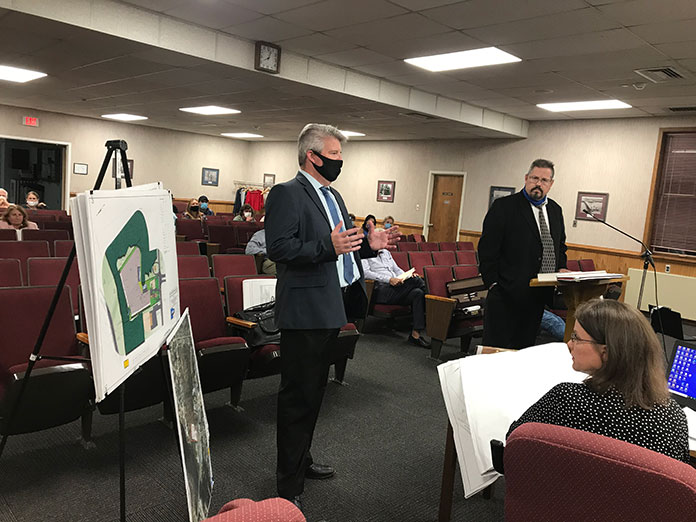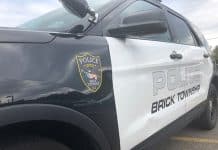
BERKELEY – A boat yard illegally being operated on a residential plot of land, and allegedly spilling chemicals into nearby wetlands, was told to clean up the area and start fresh.
NJ Outboard had been using a residential area as a boat yard all summer. They installed three-story boat racks and had staff moving boats in and out of there throughout the season.
The area is in the woods between Scott Drive and Browning Avenue, east of Route 9. They had no official driveway, but were using the intersection near the Wawa gas station and Sylvan Lakes Boulevard.
Neighbors living behind the property, in the Scott Estates neighborhood, have been coming to the Township Council meetings to protest it. They said NJ Outboard cut down trees, buried some of them on the property, built unsteady racks over them, and used fill that hasn’t been tested. All of this was done without township or environmental permits.
The township fined them. NJ Outboard then applied to the Zoning Board to allow them to operate as they have been, just legally this time.

The application began as it normally would. Representatives for NJ Outboard, attorney Joseph Lane and engineer Brian Murphy, presented their plan to the Zoning Board. They showed a rendering with two buildings and trees to be installed as a buffer for the neighbors.
Normally, Zoning Board members and their own engineers would ask questions and debate the merits of the plan. And for a while, that was what happened. Members of the public were able to talk about their concerns, as well.
Dorie Craig, who lives behind the property, listed reasons the plan should be denied. The property is unsafe, and could be an attractive nuisance to kids. Oil is leaking from the site into the Florence T. Allen conservation area, which feeds into Mill Creek, which feeds into the Barnegat Bay. Open paint cans are left out.

“This property is an environmental disaster and an accident waiting to happen,” she said.
Tom Prosser also protested the development. “Everything they’re doing is wrong. Nobody has done anything about it,” he said, meaning that the town has let them get away with it.
Dylan Shelkin also lives behind the property, and bought the house during a foreclosure and has built it up for a place to hopefully one day raise a family.
“I feel like we had a lot of equity in the house, but now I feel like I wasted the last three years,” he said.
The public was not alone. Zoning Board engineer Ernest Peters said he had a 13-page list of questions for the plan that was put together by himself and Zoning Board planner Melanie Adamson. At one point, every member of the Zoning Board held up their own lists.
“Why are we doing this?” asked board member Louis Tuminaro. “There’s nothing to be talked about. Everything was put on (the property) illegally. It needs to be removed.”
The evening got heated at times, with some colorful language being used. Prosser was asked to be escorted from the building by police officers that were on hand.
The owner of NJ Outboard said through his attorney that he had a reputable contractor who assured him that everything was being done above board. He also said he had a stroke earlier and did not remember what was done.

The Zoning Board needed to take a short break to determine how to handle the situation. At issue was control. If they flat-out refused to allow anything, the property owner could legally appeal to the State Supreme Court. Then, it would be out of their hands. The town would no longer have control over what went there.
Ultimately, the Zoning Board allowed NJ Outboard to split the application. One part of it was whether the boat yard could be allowed on the residential area. That part was approved.
The other part was the actual plan to build and operate on it. That part was kicked back for the owner to come up with a better plan.
In essence, the Zoning Board approved the change of use from residential to commercial in order to get control over what goes there. As a stipulation of that approval, they ordered NJ Outboard to build a fence around the property to keep kids out. The town gave the owner 60 days to remove everything they had put there, including the buried trees and the fill dirt.






